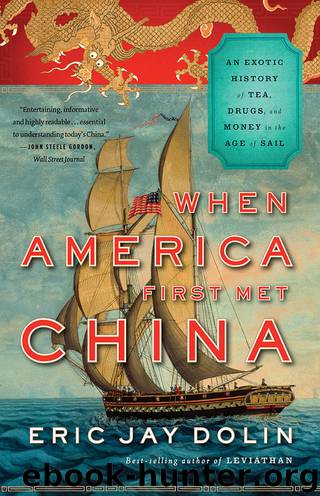When America First Met China by Eric Jay Dolin

Author:Eric Jay Dolin
Language: eng
Format: epub
Publisher: Liveright
Published: 2012-08-14T16:00:00+00:00
FOR THE AMERICANS the economic imperative was paramount. After all, the main reason they had come to China was to earn a competency, their golden ticket back to the States. Never mind that in the lives they had left behind many of the traders were highly religious, upstanding members of their communities, who were active in philanthropic causes and were considered moral men by their contemporaries—in China they operated according to different rules. “China traders were,” observed Downs, “rational, profit-maximizing entrepreneurs in Canton. They had come to seek a fortune; they would wrest it from China and go home to practice their ethics.”15
If the British and American traders needed any additional reasons to pursue the opium trade without restraint, they could point to the fact that neither of their governments put any roadblocks in their way. The British government had repeatedly sanctioned the trade, preferring to place revenues above principles.16 And as for the American government, although it was well aware that its citizens were participating in the trade, on the subject of whether they should be doing so it had said nothing at all. The only other government that could have stood in the way of the foreign traders was the Chinese, but its efforts to curtail the opium trade continued to be relatively ineffective. Indeed, the traders had nothing but contempt for such efforts, as Hunter’s cynical analysis of the situation makes clear:
We were threatened and re-threatened with the “direst penalties if we continued to sell foreign mud to the people[.]” . . . Truly, “forbearance could be no longer exercised,” and we continued to sell the drug as usual. Our receiving ships at Lintin were no longer to loiter at that anchorage, but “forthwith to come into port or return to their respective countries.” The heart of the ruler of all within the Four Seas was full of compassion. “Yet now, no more delay could be granted, and cruisers would be sent to open upon them irresistible broadsides;” and in spite of these terrors the ships never budged. . . . [E]verything worked smoothly and harmoniously by acting in direct opposition to what we were ordered to do. We pursued the evil tenor of our way with supreme indifference, took care of our business, pulled [rowed] boats, walked, dined well, and so the years rolled by as happily as possible.17
As the emperor carefully considered his options, it was becoming increasingly evident to the foreigners that the trade was not going to be legalized, because the Chinese redoubled their enforcement efforts with each passing year. Numerous opium smugglers and dealers were arrested, with one of the latter being tied to a wooden cross in Macao and strangled, then left hanging for two days as a warning to others who might disobey the law. The Chinese destroyed a floating hospital in Whampoa because they thought it was nothing more than a disguised opium depot. Nine foreigners selling opium, including one American, were ordered to leave China. Although the order was not carried out, the message was clear—the authorities were watching more closely than ever.
Download
This site does not store any files on its server. We only index and link to content provided by other sites. Please contact the content providers to delete copyright contents if any and email us, we'll remove relevant links or contents immediately.
| Arms Control | Diplomacy |
| Security | Trades & Tariffs |
| Treaties | African |
| Asian | Australian & Oceanian |
| Canadian | Caribbean & Latin American |
| European | Middle Eastern |
| Russian & Former Soviet Union |
The Secret History by Donna Tartt(19027)
The Social Justice Warrior Handbook by Lisa De Pasquale(12182)
Thirteen Reasons Why by Jay Asher(8883)
This Is How You Lose Her by Junot Diaz(6872)
Weapons of Math Destruction by Cathy O'Neil(6260)
Zero to One by Peter Thiel(5782)
Beartown by Fredrik Backman(5734)
The Myth of the Strong Leader by Archie Brown(5491)
The Fire Next Time by James Baldwin(5423)
How Democracies Die by Steven Levitsky & Daniel Ziblatt(5211)
Promise Me, Dad by Joe Biden(5139)
Stone's Rules by Roger Stone(5078)
A Higher Loyalty: Truth, Lies, and Leadership by James Comey(4946)
100 Deadly Skills by Clint Emerson(4911)
Rise and Kill First by Ronen Bergman(4775)
Secrecy World by Jake Bernstein(4738)
The David Icke Guide to the Global Conspiracy (and how to end it) by David Icke(4696)
The Farm by Tom Rob Smith(4500)
The Doomsday Machine by Daniel Ellsberg(4481)
